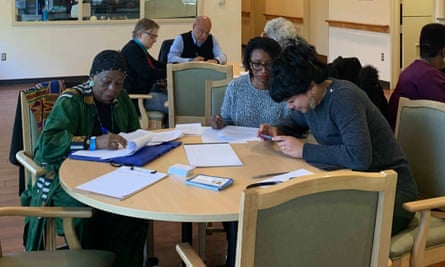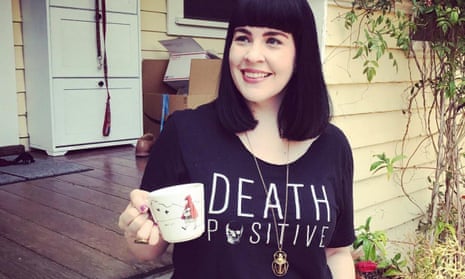A writing class with a twist is taking place in a community centre in Washington DC. A group of men and women, young and old, are learning the art of writing an obituary. Their own obituary.
None of them is at death’s door – in fact, most are in fine shape – but the workshop’s organiser, Sarah Farr, has asked them to think what their obituary might look like if, let’s say, they were run over by a bus tomorrow.
Obituary workshops, as they are known, have taken hold across America, the latest incarnation of the “death positivity” movement, which aims to stamp out “death denial” by forcing people to think about dying while they are still alive.
The idea of writing his own obituary terrified Bob Hoffman, who for years has struggled with his fear of death. Yet something about putting pen to paper, and the sense of control it gave him, began to turn that pain into pleasure. “Hoff has transitioned to the next adventure,” he starts his obituary. “After many years of ‘end-of-life’ preparation, Hoff is now exploring the best ways to continue his energy and spirit in a new realm.”
Now on a roll, Hoffman leaves well-wishers a list of places to visit his ashes – Washington DC, New York and Vermont are among the more scenic options on a list of 13 possible day trips. But he reminds them: “Whenever you desire, simply think of him – because he will still be with you.”
Back in the land of the living, 74-year-old Hoffman says he relished the idea of defining his own legacy before someone else beat him to it. It also helped him get over his dread of the unknown. “I thought of death as an empty hole of black nothingness – it put me into a very negative mind-set,” he says.

Choosing what he wants to be remembered for, and attending death cafes – where likeminded customers chat about mortality over coffee and cake – have forced him to think about dying in a more positive way, he says. “It’s giving me a lot of late-life pleasure,” he says.
Thinking about your death can really help you get clear about your life, agrees Farr, a trained death doula.“It’s a hard thing to do but the idea is to see where your pen and paper take you, and run with it,” she says.
Farr sets the group another exercise: to write what she calls a “fantasy obit” – the death notice they would like to see written about themselves if they live a full life, imagining all the things they are yet to achieve.
“What it comes down to is that society will be better if we have frank, open conversations around death,” says Caitlin Doughty, the founder of the death positivity movement, in a phone call from her Los Angeles funeral home. “Everybody’s thinking about death all the time – it’s the preoccupation of universal human experience”, she says. “The goal isn’t about not being scared of it – the goal is to grow awareness through education.”
Those sentiments resonate with retired hospice nurse Barbara Wagner, one of those at the Washington workshop. “It’s helped me find a way to look at my bumpy life in a humorous way,” she says. “It feels freeing and cathartic and just joyful.”
Wagner describes in her obituary how she married high school sweetheart Buzz and had two children by the age of 21. “When Buzz got a motorcycle and rode off with the Hells Angels at the age of 22, Barbara was called to re-consider her life – an act she did regularly from then until her death last week at age 100.”
“There’s not much fantasy in there, it’s mostly true,” she says.
The workshops are not just attracting older people. In fact, Farr says, people in their 20s and 30s are the fastest growing group.
One of them, Rachel Wynn, a social media entrepreneur, believes that younger people are more open than their parents’ generation to talking about death.
In part, she thinks, this is because there’s so much exposure to death on social media; she remembers, for example, the shared online grief with friends when actor Heath Ledger died in 2008.
Writing her own obituary has been an epiphany, she believes, because, despite being only 30, it made her feel that she hadn’t achieved enough in her life. “It was like, wow, I really need to get my shit together,” she says.
Wynn has even gone to the next extreme and attended a workshop where she “went to her own funeral”. She recalls having to lie down on a blanket cut into the shape of a coffin, while a shroud was placed over her body and a beanbag over her eyes.
“That was intense,” she says. “It was like we really had died and were being buried.”
“It’s like a harsh wake-up call. Are you living the life you’re happy with?” she says. “Because you could die any minute.”
